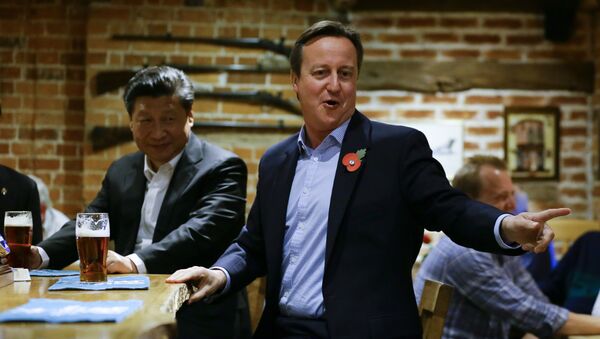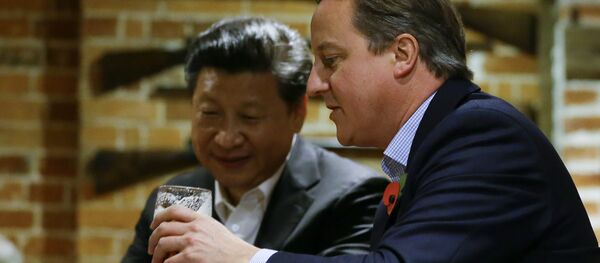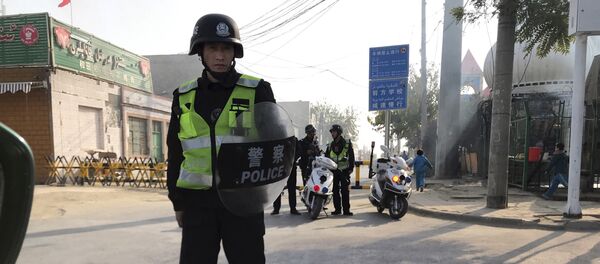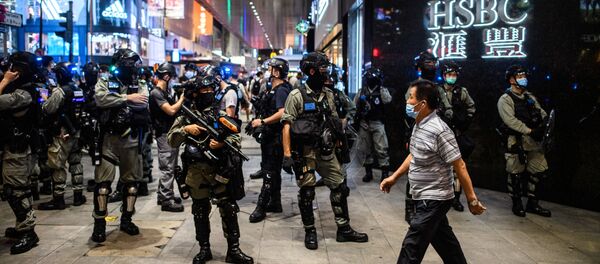Strong comments were voiced by Chinese ambassador to the UK Liu Xiaoming on Thursday, who said the UK had "seriously poisoned" ties with Beijing after barring Huawei Technologies from a role in building British 5G networks and criticising Beijing over a new national security law in Hong Kong.
Amb Liu made similar comments in early May, where he accused British officials of drumming up anti-Chinese sentiment amid the ongoing COVID-19 pandemic and promoting a "Cold War mindset" amid calls for a review on UK-Chinese policy.
The strong statements come as Sino-UK relations have soured following the "Golden Era" under the Cameron Administration, who approved massive levels of investment in technology and numerous forms of cooperation.
But relations under UK prime minister Boris Johnson have deteriorated into a 'new Cold War' as London struggles to balance post-Brexit interests and ink a trade deal with the United States in the absence of a deal with the European Union.
Sputnik takes a look at some of the lowest points in recent history between Downing Street and Chinese Central Government.
RUSI Report Raises Red Spectre Fears Over London
The UK's Royal United Services Institute (RUSI) published a report in February last year speculating on how to counter Beijing's rising global influence via technology, including technological advancements and Huawei, among others
"The ultimate donor should be clear, even when monies are channelled through British citizens," the report added.
It later hinted former prime minister David Cameron was being led by officials in Beijing via its Belt and Road initiative, which was proposed by Chinese president Xi Jinping in 2013. The Cameron Administration had invested roughly $1bn in the bank's numerous projects and £50m in a private fund, which had "gained some attention", according to the report.
Despite failing to provide specific examples, it also alleged that Chinese subterfuge was "more subtle, incremental and often under the radar, although it is occasionally brazen," and called for a ban on companies such as Huawei in UK infrastructure, namely in 5G and telecom networks.
British UN Diplomats Back HRW Report On Alleged Uyghur Concentration Camps
Further Sino-UK tensions ramped up after 22 delegates at the United Nations, including UK permanent representative HE Julian Braithwaite, backed a report from the Human Rights Watch in a joint statement in July last year.
The letter to the UN Human Rights Council called on China to "uphold its national laws and international obligations and to respect human rights and fundamental freedoms" in Xinjiang, citing the allegations from the HRW report.
But the report, submitted to the UN Committee on the Elimination of Racial Discrimination (CERD) in September last year, admitted that there was "no official data" on the number of people detained in the alleged camps but claimed "tens of thousands" to "one million" had been held by Chinese authorities.
"People of all ethnic groups in Xinjiang have fully enjoyed all human rights in a peaceful and safe environment, which has been widely recognized by the international community," he said at the time.
A further joint statement from Belarus and 53 countries, including Pakistan, the Russian Federation, Bolivia, Serbia and others, defended China's efforts to counter radical extremism in the Western autonomous province, adding that "terrorism, separatism and religious extremism has caused enormous damage to people of all ethnic groups in Xinjiang".
The joint statement added that "not a single terrorist attack" had taken place in Xinjiang in the past three years and that people in the province enjoyed a "stronger sense of happiness, [fulfilment] and security".
Downing Street Decision On Huawei Reversed
A contentious decision to reverse a role for Huawei Technologies prompted outcry from company officials following a UK Science and Technology committee grilling and review from the UK's National Cybersecurity Centre (NCSC) on whether the Chinese telecoms giant posed any risks to British cybersecurity and IT infrastructure.
In previous statements, the Shenzhen-based firm urged the UK government to boost internet connectivity across the country, namely due to the ongoing COVID-19 pandemic and government pledge to build full-fibre and gigafast internet infrastructure in key regions.
But Culture State Secretary Oliver Dowden announced in July that all Huawei network equipment would be replaced by the end of 2027 and banned the sale of its components by the end of 2020, citing concerns from US sanctions.
The 'rip and replace' measures are set to cost UK telecos such as BT, Three, Vodafone and O2 billions and could take up to ten years to complete, according to statements.
Despite the accusations, Huawei has poured investment into the UK, namely via a Cybersecurity Evaluation Centre in Banbury, which reports directly to the NCSC, and a 5G Innovation Centre in London as well as pledged £20m to British and Irish app developers for the company's fledgling AppGallery store and Huawei Mobile Services (HMS) platform.
The news comes after the US designated Huawei and ZTE as national security threats, citing concerns that the Chinese firm could use its equipment to spy for Beijing, which both Huawei and the Chinese government have sharply denied.
No evidence on the claims has been submitted by the US government to Chinese authorities or Huawei to date.
Hong Kong National Security Law Sparks Major Diplomatic Row
UK authorities have also provoked backlash from Chinese officials after protesting the country's National Security Law aimed a confronting a years-long crisis in Hong Kong involving secessionist protests across the region.
The law, which enforces the extradition of criminals in the special administrative region to the mainland, was slammed by Chris Patten, Hong Kong's last governor, as driving "a coach and horses" through the 1997 'One Country, Two Systems' agreement, where the country was returned to Chinese rule after a 99-year lease with London.
Opponents of the National Security Law were "enemies of the people", Lam added in a separate statement.
The Hong Kong government doubled down by appointing hardliner Mr Zheng Yanxiong as its National Security Advisor to oversee the implementation of the new law as it enters force this month.
Former UK Official Accuses China of 'Covering Up' COVID-19 Response Amid US Accusations
Further diplomatic rows between Beijing and London erupted after former MI6 head Sir John Sawers alleged on British media that Beijing was not honest about its role in the coronavirus pandemic and may face the ire of international leaders.
Speaking to the BBC Radio 4 Today programme, he advised US president Donald Trump to redirect his anger at China rather than the UN but added the World Health Organisation (WHO) should face scrutiny for its role in COVID-19.
The comments came just a day after a Policy Exchange think tank criticised Western foreign policy toward China, which urged a tighter and hawkish Transatlantic policy toward the world's second-largest economy.
Anger intensified in Beijing after US secretary of state Mike Pompeo suspended funding to the WHO, adding that Washington may never contribute to the organisation unless it 'changed its behaviour' and admitted it had covered up the pandemic earlier this year along with China. The US official also threatened to replace the WHO with a new US-led body.
But Chinese foreign ministry spokesman Zhao Lijian slammed the move, calling the WHO "irreplaceable" and stating Washington's decision would "weaken the WHO's ability to handle the pandemic", namely underdeveloped countries.






